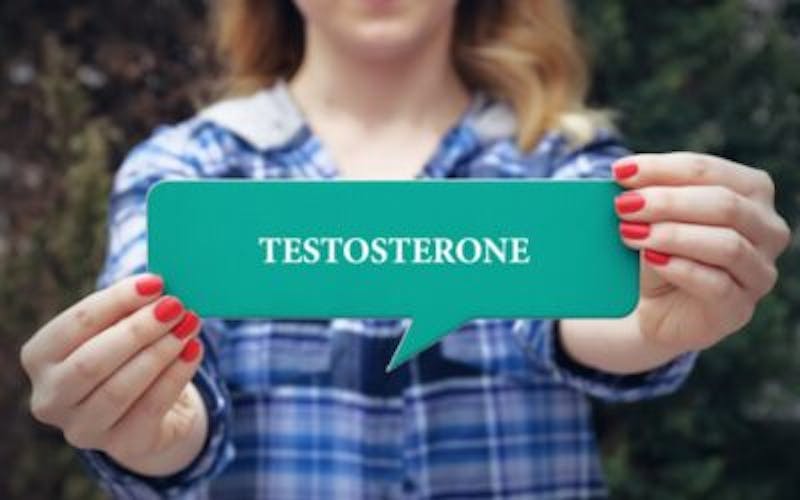
Most conversations surrounding testosterone replacement are usually about men seeking treatment for low testosterone levels, or “low T.” A lot of men and women may not realize that women also need testosterone in smaller amounts. Testosterone, one of the main sex hormones of a woman’s body, helps many bodily functions run properly, including her sex drive, energy, and mood. Because of its crucial role in a woman’s everyday life, women may want to know whether or not they have lower testosterone than normal, and if so, explore possible treatment options.
Causes
From the time of her late teenage years, a woman’s testosterone will continue to decline. By the time a woman is 40, her androgens have been lowered by half. It becomes especially low during and after menopause. That said, women who have had their ovaries surgically removed, women whose adrenal glands are not functioning properly, and women who experience pituitary issues may also experience low testosterone at an even earlier age. You might not be aware but many medications, including Birth control pills will lower Testosterone.
Antidepressants, steroid inhalers for asthma, antihistamines like allergy medications, statins (cholesterol lowering medications), opioids, etc are among the best known.
Symptoms of Low Testosterone
Symptoms of low testosterone in women (also called low androgen) include loss of sexual interest, depression, lowered motivation, tiredness and weight gain. However, a patient must work with her doctor to be certain low testosterone is the root cause of these issues. Certain other conditions, like hypothyroidism, iron deficiency, etc can display similar symptoms. The best way to test for low testosterone is through a blood test. There is some agreement that Testosterone levels should be between 15-75 ng/dL. Some hormone replacement experts even advocate for higher T levels in women – recommending a Testosterone level that should be 10-20% of optimal Male Testosterone levels (750-1000 ng/dL).
What are ways we can increase Testosterone levels naturally in women?
- A healthy diet can maintain general health and healthy hormones. Avoid increased carbs, binge eating, excessive alcohol use and smoking.
- Work on your stress and minimize or eliminate stressors. What are your energy drainers? Do you have habits, people or a demanding schedule that interfere with your mental and emotional health and drain you day by day? Laugh more and have fun. Spend more time with people you like, respect and love.
- Regular exercise and some specific forms of exercise like weight lifting or resistance training HIIT (high intensity interval training) can help maintain and boost T levels.

- Take vitamins regularly and focus on what your levels of D vitamin might be? Are you taking Zinc? It helps T levels and your immune system.
- Are you rested? Do you sleep enough? Get 7-8 hours of restful sleep every night. If your sleep quality is poor talk to your doctor about why, and how you can improve sleep quality. Taking controlled prescription pills for sleep is not a solution to your sleep problem.
- Certain herbs like ginger, ashwagandha, mucuna pruriens can help your sex hormones and sexual desire.
- Avoid exposure to toxins like BPA, parabens, etc, or drugs, steroids, opioids, EMF. Consider a periodic detox/cleanse program.
You tried everything and testosterone is still low – what is the next step? Replacement
Luckily, there are some options for testosterone replacement. It can be prescribed in a daily cream form or injected as a pellet or as part of a combination hormone replacement therapy. Studies have found that women undergoing testosterone replacement were able to find success in reducing fatigue and depression symptoms, as well as increasing sex drive and improving mood. Additionally, a study of 51 women found that this treatment also brought stronger bones, more muscle mass, and more fat-free mass.
Considerations
Women taking testosterone replacement should find a fail-safe way to prevent pregnancy, as testosterone replacement has been shown to have adverse effects on a developing fetus. Furthermore, in the US, testosterone replacement has only been FDA approved only for men, not for women. However, this is true for many drugs that are still widely prescribed and used.
Combating Myths
Some women hesitate to take testosterone because of various myths that have been circulating about it, including the idea that it may lower their voice or cause unwanted body hair. These myths have been largely debunked. However, some women will be more prone to convert their Testosterone to DHT (di-hydro Testosterone) and therefore they will be more prone to develop side effects like male pattern baldness, acne, excessive hair growth. Measuring levels and close follow up can prevent these issues as there are medications like spironolactone, that block the T to DHT conversion.
Long-Term Benefits
While aging causes a natural lowering of testosterone, many women find that supplementing their testosterone through hormone replacement therapy gives them a generally better quality of life, including improved mental and emotional health. A woman’s sexual health plays a huge role in her overall health and outlook. Furthermore, the benefits of increasing bone density and overall strength are also huge. If a woman is feeling the effects of lowered testosterone, supplementing it might be a viable option for beginning to feel like her old self once again. Many women have been able to stop using antidepressants and felt their mood revert back to normal on Testosterone therapy. Some women have been able to lose weight a lot easier and were able to keep the weight off once they started T replacement.

For more information on how to check your Testosterone levels or how to address low T please call us to make an appointment at HERA Health Care – Mirela Cernaianu, MD. We are located in Westlake Village, CA 91361 at 910 Hampshire Rd, Suite A.
We hope this blog has been useful and to keep receiving our emails please subscribe on our website www.herahealthcare.com


